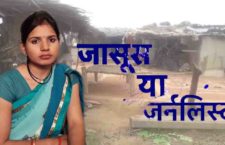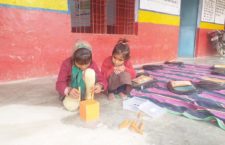“If women can make rotis at home, they can also bring Inquilab” says Tarannum, a protester at Shaheen Bagh.
Amidst the ongoing protest against the discriminatory implementation of the Citizenship Amendment Act and the National Register of Citizens in the capital, Delhi’s Shaheen Bagh has become the locus of mobilisation and revolution. With all our experience of speaking to women from the ground, on their experiences of citizenship or the exclusion from it, we were curious to know what drove the women in Delhi’s Shaheen Bagh to sit in the cold for over a month, to voice their dissent.
Mohreen Nisha, one of the protesters at Shaheen Bagh, has been sitting in at Shaheen Bagh since 31st of December 2019. “I could not get leave from work, hence I had to leave my job to come here and protest. It is a question of our citizenship and identity, as long as we don’t have that, what good will working do?”
Anger brings her to the protest, and she makes no bones about it. “Given how poverty stricken India is in the first place, how are we supposed to produce documents from our grandfathers and great grandfathers? Where is our home? Whatever violence took place in Assam, can very well take place here as well,” she says. She doesn’t stop there, either, “it is highly unfair that the migrant Hindus from Pakistan, Bangladesh and Afghanistan have been given refuge and citizenship in India while the Muslims from those areas are discriminated against. Are we Musims not Hindustani? They are deliberately targeting us Muslims.”
“First demonetisation, then Triple Talaak, then the usurpation of Babri Masjid, now will they throw us out of Hindustan also? Where will we go? Hindustan is mine and it will forever remain so” said another protester.
We were keen to know how women mobilised to protest at Shaheen Bagh. Tarannum says, “When a woman is quiet, she remains so, if she can make a heaven out of her home when she is calm, she can also make hell out of her home, if she is triggered. So that woman today is Durga, Laxmibai, Fatima and Razia Sultan – as today it has come to the preservation of her rights. We need to stand up for our rights and claim them, but how is the question. Even if some members of the family are able to produce their documents, what about the one member who can’t? It can be you, me or anyone else! Why are we to stand in lines and prove that we belong to Hindustan?”
Sharbi, another protester voices her opinion by requesting Modi to repeal NRC/CAA. She says “ How will we leave our Hindustan and go somewhere else? Hindustan humara hai, Hindu, Muslim, Sikh, Isaai, sab bhai bhai. No one is leaving the country.”
82-year-old, Bilkis, who has been a prominent face in the media reports on the sit-in, “I have never seen such a tussle between the people and the government before this NRC or CAA” she says.
“I am a woman and a Hindustani, hence as a Hindustani woman it is my duty to repair what has been done to the constitution. It is our duty to stand up against this ‘black law’. And the number of women who have protested at Shaheen Bagh this time, is astonishing. Never in the history of the country has this ever happened,” says one of the protesters. She further tells us that the protest happening here is also for what happened to the innocent kids at Jamia Milia University. She condemns the violence that was carried out against protesting students by the police. “Usually mothers tell their kids to stay home as the weather is cold and the environment is volatile, but here women have now come out when the situation has reached boiling point,“ she concludes.
Shama Parveen, another protester responds indignantly to comments that Congress is influencing the Muslims to revolt as it would be beneficial to them. “We are capable enough to fight for ourselves and we are not allying with the Congress. If there is something on our plates, we can see it and even when there is nothing on our plates, we can see it then too. We see with our own eyes.”
“We will not move from here. What does the government think of us? The government should know that revolution will come, we will be free. Our revolution will be the greatest history has ever seen. We fought the British for 90 years, we won’t let a handful of these Sanghis to take our rights” a furious protester concludes.
All through history, whether for their own vote, or for the independence of their country, for disappearances of their family members in times of war, women have come on to the streets. Every day, women battle within their homes against injustice and oppression. It is no surprise then, in a time when the foundations of the constitution and the nation are in question, women push those in power to be accountable. The anger and patience, the resilience and clarity of purpose in the women at Shaheen Bagh is a source of strength and inspiration.

